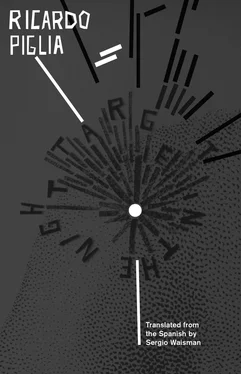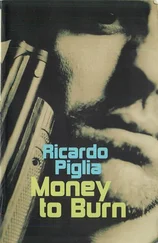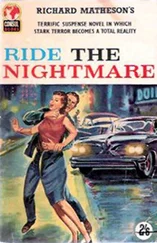Ricardo Piglia - Target in the Night
Здесь есть возможность читать онлайн «Ricardo Piglia - Target in the Night» весь текст электронной книги совершенно бесплатно (целиком полную версию без сокращений). В некоторых случаях можно слушать аудио, скачать через торрент в формате fb2 и присутствует краткое содержание. Год выпуска: 2015, Издательство: Deep Vellum, Жанр: Современная проза, на английском языке. Описание произведения, (предисловие) а так же отзывы посетителей доступны на портале библиотеки ЛибКат.
- Название:Target in the Night
- Автор:
- Издательство:Deep Vellum
- Жанр:
- Год:2015
- ISBN:нет данных
- Рейтинг книги:3 / 5. Голосов: 1
-
Избранное:Добавить в избранное
- Отзывы:
-
Ваша оценка:
- 60
- 1
- 2
- 3
- 4
- 5
Target in the Night: краткое содержание, описание и аннотация
Предлагаем к чтению аннотацию, описание, краткое содержание или предисловие (зависит от того, что написал сам автор книги «Target in the Night»). Если вы не нашли необходимую информацию о книге — напишите в комментариях, мы постараемся отыскать её.
is an intense and tragic family history reminiscent of
, in which the madness of the detective is integral to solving crimes.
, a masterpiece, won every major literary prize in the Spanish language in 2011.
Ricardo Piglia
Target in the Night — читать онлайн бесплатно полную книгу (весь текст) целиком
Ниже представлен текст книги, разбитый по страницам. Система сохранения места последней прочитанной страницы, позволяет с удобством читать онлайн бесплатно книгу «Target in the Night», без необходимости каждый раз заново искать на чём Вы остановились. Поставьте закладку, и сможете в любой момент перейти на страницу, на которой закончили чтение.
Интервал:
Закладка:
The mental hospital was well outside the town, in a circular arrangement originally used as a convent. Standing on its own at the end of the road leading to the bluff, it looked isolated, rising over the hill, near the lake and the sown fields to the west, like a mirage in the deserted plains. There was a stone wall around the property, lined with broken glass, and a tall door with iron spikes. Renzi walked in and across a large lawn. As he advanced up the graveled path, he looked at the whitewashed trunks of the trees, barer and taller the closer he got to the building. Finally, he reached the large front door, and after a while an orderly let him in. The rooms for the women were toward the back; in the men’s block there were only three patients.
Croce sat on an iron bed secured to the floor, leaning back against a mattress that he had rolled-up, dressed in a gray robe that made him look older. He wore a wool cap on his head and his eyes were bloodshot, as if he hadn’t been sleeping. Behind him, two other patients stood and faced each other. They seemed to be playing some kind of silent game, with hand and finger signs.
It took Croce a moment to say hello. At first Renzi thought that he didn’t recognize him.
“Saldías sent you,” he said. It sounded like a question, but it was a statement.
“No, not at all. I haven’t seen him,” Renzi said. “How are you, Inspector?”
“Not good.” He looked at Renzi as if he didn’t remember who he was. “I think I’ll stay here for a few days, get some rest, then we’ll see. Every once in a while you need to spend some time in the nuthouse, or in jail, to understand what this country is all about. I’ve already been in jail, years ago. I think I’ll take a break here now.” He smiled, a sparkle in his eyes. “They suspect dementia.”
Renzi had brought him two packs of Avanti cigarettes, a can of peaches in their own juice, and a rotisserie chicken from the Madariaga Store and Tavern. Croce put everything in an apple-crate he had pushed up against the wall, which he was using for storage. Renzi saw that inside he had a shaving brush, soap, and a razor without blades.
“Listen, kid,” Croce said. “Don’t pay any attention to what people say about me in town. I can just hear those idiots talking.” He touched his forehead with his finger and smiled a smile that lit up his face. “Did you see my little notes? I’ve written two more.” He looked inside the rolled-up mattress and took out two sealed envelopes. “Mail these for me, will you?”
“But there’s no address on them.”
“It doesn’t matter, drop them in the mailbox in the main square. I’m going to get those shits. And that Judas, Saldías, what do you make of him? To think I actually liked him. I must be some kind of idiot. He accused me of drawing conclusions that weren’t scientific enough. So I ask him: ‘What do you mean by that?’ And he answers: ‘They’re not deductions, it’s all intuition.’” Croce smiled mischievously. “Fools, the bunch of them. But I’m not complaining, if you complain in here you never get out.” He lowered his voice. “I unlocked a laundering scheme that was being used to transfer secret funds to open channels, so they could keep everything. That’s why Durán was killed, to redirect the money, or to squirrel it away. It’s older than Methuselah. But the dollar bills were unmarked and I declared it all, and they’re not going to forgive me for that. If you find a clean hundred thousand dollars and don’t take it, you’re made out to be dangerous, they know that you can’t be trusted. Same thing happened to el Chino Arce, he only took what he needed, he left the rest behind in that bag with the abandoned luggage. And when he saw the trouble coming his way, he had to kill himself, poor kid, he got involved with some real heavies. Now they’re waiting for me to do the same thing, but I’m going to get them. Instead of writing posthumous letters, I’m writing my last letters.” He smiled. “They’re all addressed to the judge. There’s nothing worse than being a judge. Much better to be a cop, although I’m sorry about that, too. I spent my life ridding the Province of all the political caudillos and ended up more alone than Robinsón,” he said, placing an accent on the last syllable of Crusoe’s name, as if he were trying to rhyme the end of a line. “One time, in the town of Azul, I sent an Italian to jail for killing his wife, but he turned out to be innocent, the woman had been killed by some random drunkard. He spent six months in the penitentiary, that man, and I’ve never been able to forget him. When he got out, he seemed lost, he never recovered. Another time I mowed down this little thief in Las Lomas, he’d locked himself in a country house with a hostage, a farmer who cried like a little baby, I used a mattress as a cover and charged in, killed the thief with one shot, poor kid — and the farmer, the hostage, he got out just fine, except that he’d messed himself. That’s what happens. We live in pain and shit. My father was an Inspector and he went mad, my brother was killed in ’56, I’m an ex-Inspector and here I am. One time I was so desperate I went into a church, I had gone to Rauch with a rustler, the guy begged me to let him go, he said he had two baby boys, what can I tell you? I left him in the prison and went for a long walk, I couldn’t get that gaucho out of my head, he carried a photo of his two little darlings with him, that’s what he called them, his little darlings. So I crossed the street and walked into a church, and that’s where I made a promise that I hope I’ll always be able to keep.” He paused, thinking. “I don’t know why I remember those things, certain ideas stick in my head, like hooks, they don’t let me think properly.” He stopped again, his expression seemed to change. “I came here,” he said, with a wicked look in his eye, “because I want Cueto to think that I’m out of circulation. You have to help me.” He lowered his voice even further and gave him some instructions. Renzi jotted down a few things. Since Renzi didn’t know anything about anything, he might be able to discover something — that was Croce’s theory. Before, you had to know what was going to happen before it happened, now it was better to go in blind and see what came out of it, he said. Then he got distracted looking at the other patients.
The two men came over and stood near the Inspector’s bed, in the middle of the room, making gestures as if to ask Renzi for a cigarette. They would bring two fingers to their mouths and pretend they were smoking.
“In here,” Croce said, “a cigarette is worth one peso in the morning and five pesos at night. The price goes up every hour you don’t smoke. They’re going to offer one to us, say no, thank you, and give them one of yours.” They came closer to Croce’s bed, the whole time pretend-smoking in the air with their fingers.
Renzi gave them a cigarette and the two men started smoking it right away, taking turns, standing near them. The fatter of the two broke a one-peso bill in half and gave half of it to the other for a drag of the cigarette. Every time they took a smoke they would give the other patient half of the bill, and when they exhaled they would take the other half of the bill back. They paid with half a bill, took a smoke, exhaled, accepted half of the bill, the other would smoke, blow out the smoke, they would pass the half-bill back, the other would smoke — and the cycle accelerated and went faster and faster as the cigarette was consumed. The end of the cigarette forced them to speed up to keep from getting burned and, finally, when it was barely an ember, they threw it on the ground and watched it go out. The last one to smoke from the cigarette demanded he be given the other half of the bill back. They started screaming at each other until an orderly appeared at the door and threatened to take them to the showers. Then they sat down facing the wall, each on a different bed, their backs to each other. Croce greeted Renzi with joy, as if he’d just realized that he was there.
Читать дальшеИнтервал:
Закладка:
Похожие книги на «Target in the Night»
Представляем Вашему вниманию похожие книги на «Target in the Night» списком для выбора. Мы отобрали схожую по названию и смыслу литературу в надежде предоставить читателям больше вариантов отыскать новые, интересные, ещё непрочитанные произведения.
Обсуждение, отзывы о книге «Target in the Night» и просто собственные мнения читателей. Оставьте ваши комментарии, напишите, что Вы думаете о произведении, его смысле или главных героях. Укажите что конкретно понравилось, а что нет, и почему Вы так считаете.












